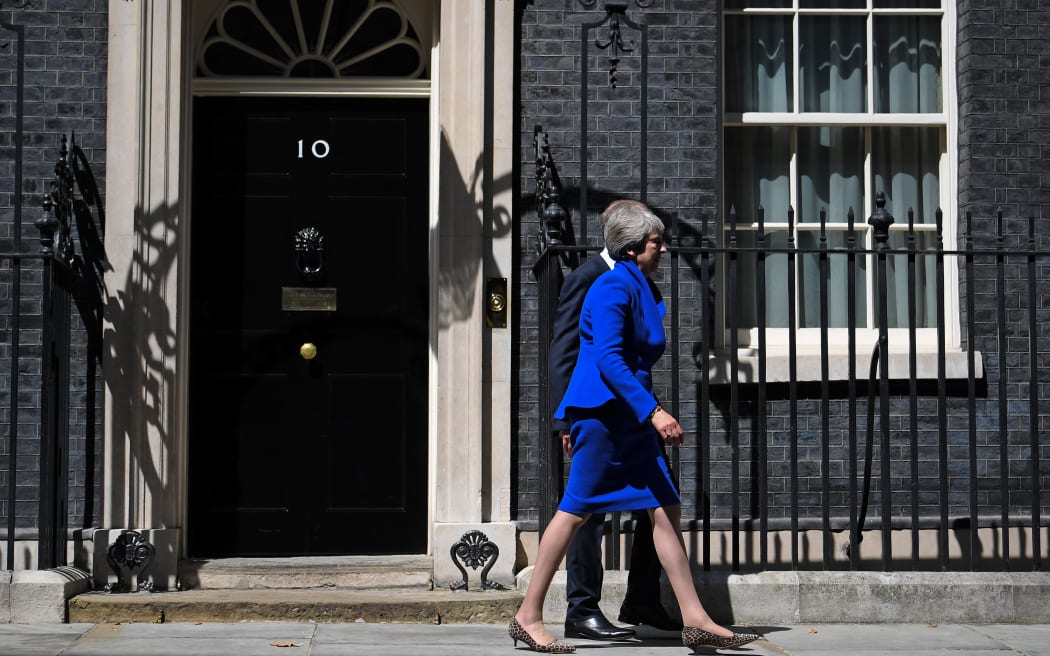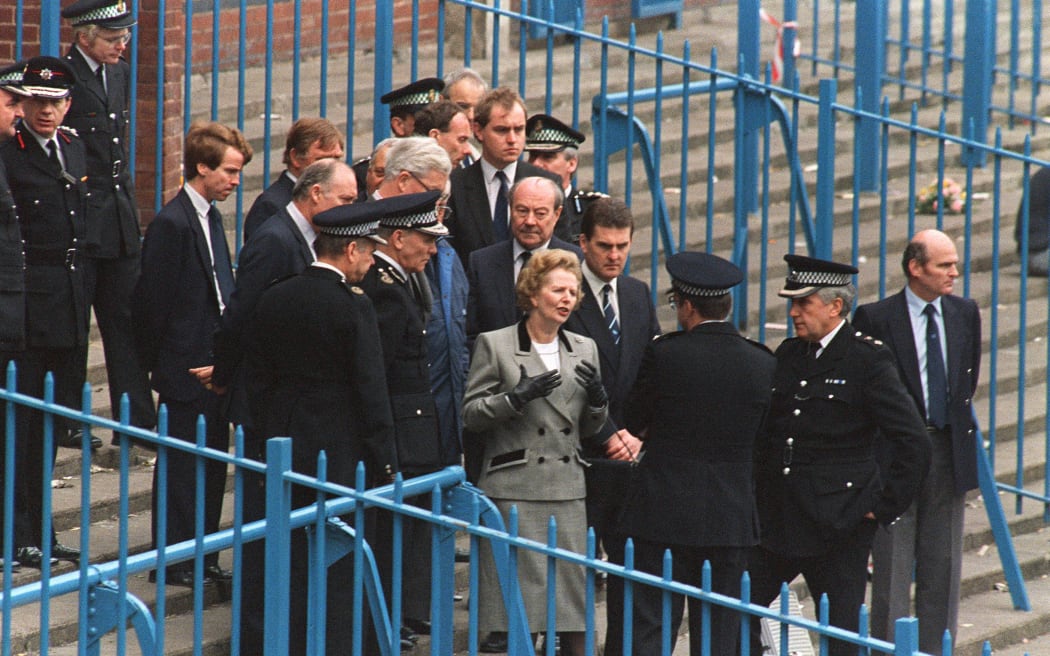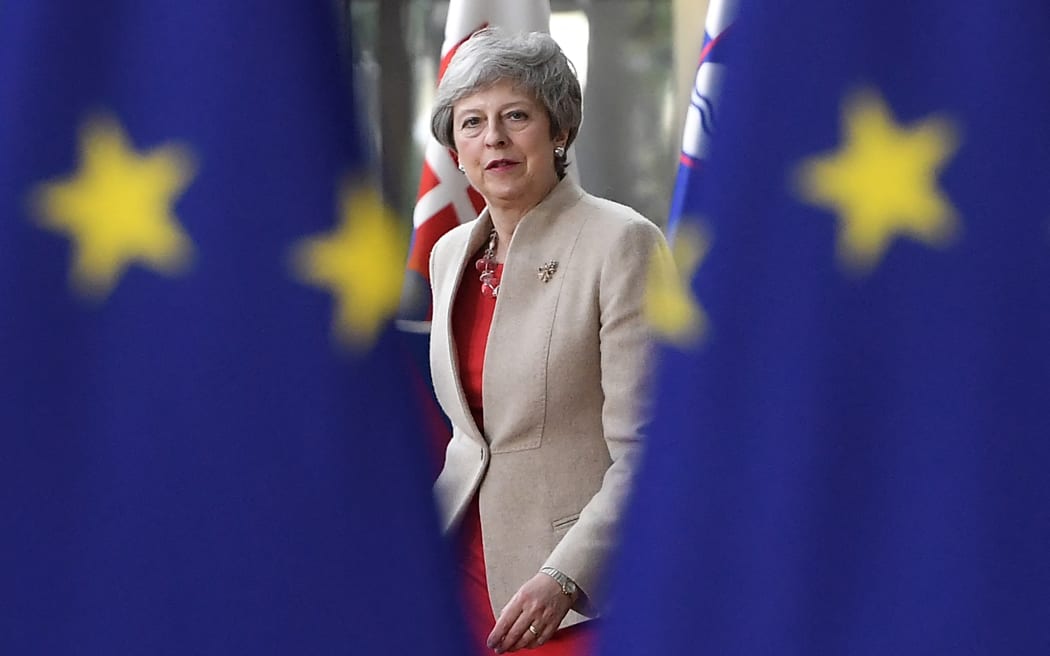Most remembered for her failure to secure a Brexit deal, Theresa May was British prime minister between 2016 and 2019 and the longest-serving home secretary in over a century.
But whilst being a 'remainer' herself, her job as prime minister was to work out how the United Kingdom should honour its 2016 Brexit referendum.
May's book The Abuse of Power: Confronting Injustice in Public Life argues for a radical rethink of politics and public life.

Britain's outgoing prime minister Theresa May ,accompanied by her husband Philip, leaves after making a speech outside 10 Downing street in London on 24 July, 2019. Photo: AFP / Ben Stansall
May told Saturday Morning's Kim Hill she is keen to expose social injustices, where powerful people have served themselves or protected their organisation, rather than serving the interests of the powerless.
Some of the examples she writes about are the hardcore Brexit remainers as well as the Hillsborough and Grenfell Tower tragedies.
Despite being on the 'remain' side of the fence in the Brexit debate herself, the former prime minister wanted to negotiate a compromise which recognised the remainers' concerns, but still aligned with the view of the majority in the referendum to leave the EU.
"Sadly, what we saw in the House of Commons was those who were perhaps on the more extreme side of Brexit, or the more extreme side of 'remain', using their power in the House of Commons to stop that compromise from being put forward and being accepted.
"And that's why I say what they were doing was not in the greater good. The greater good lay in that attempt at compromise, but they wanted an absolute position for themselves."
She was concerned by abuses of power from other countries, where a referendum is redone to accomplish a desired result.
"I always thought that was wrong. If people have been given the opportunity to give their voice, then their voice should be heard, and that is why I passionately believed in delivering [Brexit], despite having voted remain, despite having campaigned for remain."
Hillsborough Stadium tragedy cover-up
In 1989, 97 people died in a human crush at the Hillsborough Stadium, which police had blamed on fans' behaviour but a second coroner's inquest found they were killed due to gross negligent failures by police and ambulance services to fulfil their duty of care. It had also been revealed police changed witness statements and fed the media false stories.
It took more than 20 years for the truth to come to light.
The incident happened under Margaret Thatcher's reign, whom May has said she admires, but she rejected it was the ethos of the 'Iron Lady', nor a sense of individualism, which led to abuses of power to protect the institution.
"There were problems around football and football fans... there was a popular view, if you like, that had taken hold of the approach that fans took to football matches and people wouldn't go beyond that in looking at what happened at Hillsborough," May said.

Britain's Prime Minister Margaret Thatcher is shown the enclosure at Hillsborough Stadium in Sheffield on 16 April, 1989, where a human crush ultimately led to 97 people dying. Photo: AFP
Such institutional abuses of power were worrying to see, she said, adding that another case was when South Yorkshire Police failed to investigate cases of reported child abuse, which a report estimated there were 1400 victims.
"There was, I think in that case, a sense from that council, which was a Labour-run council, that there was in some sense a sort of second-class citizens - that these were girls from the sorts of families where that's the sort of thing that happened to them.
"This is appalling to treat people in that way, and those are the issues that I'm highlighting and the purpose of highlighting them, of drawing out the threads, of drawing out the similarities, is if we don't do that, then we won't learn for the future, we need to learn for the future."
Shocked by extent of abuses by faith institutions
May also wrote she was shocked to learn of the extent of abuse of power by institutions of faith.
"The point I make in the book is that, I suppose it is because of my background, it's particularly shocking that those in the church who are in that position of authority, who are trusted, in whom people have confidence and who are due to lead their lives according to a certain ethos and a certain set of Christian values [acted that way].
"But it's not just in Christianity, of course it happened in a number of religions... I suppose there's an image of people of faith as people who are less likely to act in a bad way.
"It's not naivety [to be shocked by the extent of abuse in faith organisations]... I mean by your definition, if everybody should have known the extent of this, then something should have been done about it earlier. It wasn't... because people didn't understand the extent to which this problem was taking place. And it was only because I set up an inquiry to look into it that we now know the extent."
Donald Trump holding her hand: 'Maybe he just needed help'
While prime minister, May generated a buzz of headlines in 2017 after an awkward hand-holding moment with then-US president Donald Trump was captured by cameras.
"We were... in the White House [about] to go outside to the press. And he said to me there's a slope around the corner, so be careful when you're walking down the slope. [It] wasn't much of a slope, I have to say," May told Hill.
"And I pulled around the corner and suddenly he took my hand, and so I don't know whether he was trying to help me or whether he wanted me to help him.
"The best interpretation is that he was being a gentleman. On the other hand, maybe he just needed help going down the slope."
On her successor Boris Johnson, May would not be drawn to comment about his behaviour during the pandemic - a committee finding he deliberately misled the UK parliament on rule-breaking Covid-19 lockdown parties.
May said it would have been difficult for anyone in a position of power to deal with the pandemic.
"Certainly in the very early stages of Covid... nobody really knew what the best way of dealing with it was. There would have been information coming, you know, constantly changing and coming at them and they were having to make these decisions. I think that must have been a very difficult time in government across the world."
Reflection and upcoming plans
May admitted many will remember her for Brexit, but she said changes in legislation for climate change, mental health, and domestic abuse were pivotal moments in her tenure too.
"People often ask me when I go to schools, for example, in my constituency, they say sometimes what do you want to be remembered for? And I will often say either the Modern Slavery Act or putting net zero emissions by 2050 into legislation, but I recognise that actually what everybody will look at is Brexit.
"I feel hugely privileged that I had the opportunity to be prime minister and I'm pleased that I was able to make some key changes."

Britain's then Prime Minister Theresa May arrives for a European Union (EU) summit at EU Headquarters in Brussels on 28 May, 2019. Photo: AFP / Emmanuel Dunand
She had been MP for Maidenhead since 1997, but May has signalled she will be setting up a global commission in October to crack down on modern slavery and human trafficking.
"The number of people in slavery across the world has been increasing. We need a real political momentum to deal with this, and that's what my global commission will be about."
Windrush scandal
May made the distinction between modern slavery and illegal immigration - something she told the Daily Telegraph as Home Secretary that the government aimed to create a hostile environment on.
But she denied the manner in which her government had projected this - including with public signs warning 'go home or face arrest' - contributed to a hostile environment towards people who were not white nor that it had caused the Windrush saga, where legal immigrants were at risk of deportation or lost access to services due to a lack of documentation which they weren't given in the first place.
"The reason there was a difficulty for some people who were legally in the United Kingdom was because when they had migrated to the United Kingdom, they were not given any documentary evidence that they had the right to be in the UK," May said.
"Over the years, this happened under successive governments, immigration law became more complicated and it changed people's rights in certain areas and that's why people then found, when more checks were being introduced, that they were in a difficult position."
However, she said she did apologise for the Windrush scandal in her book.

